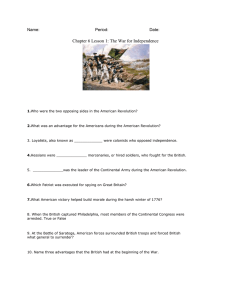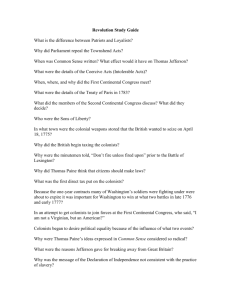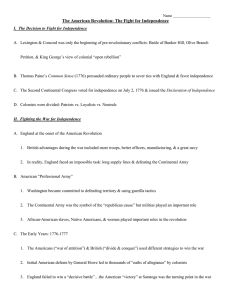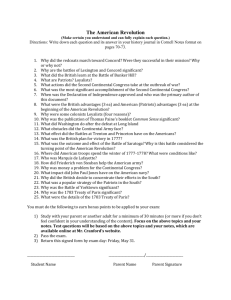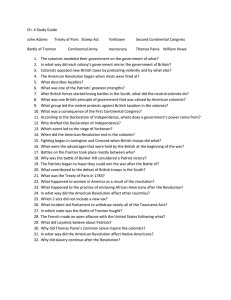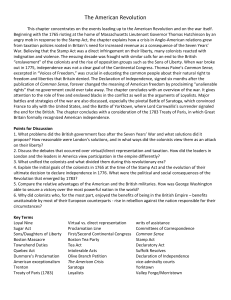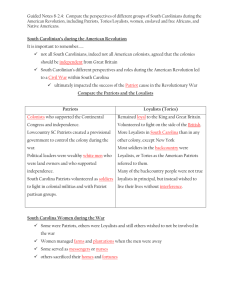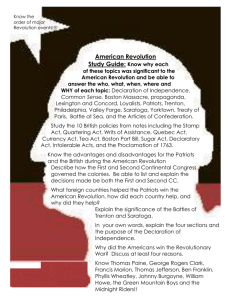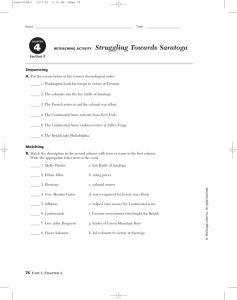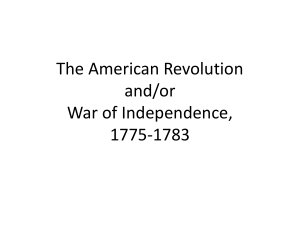US History: War for Independence Study Guide (1765-1783)
advertisement
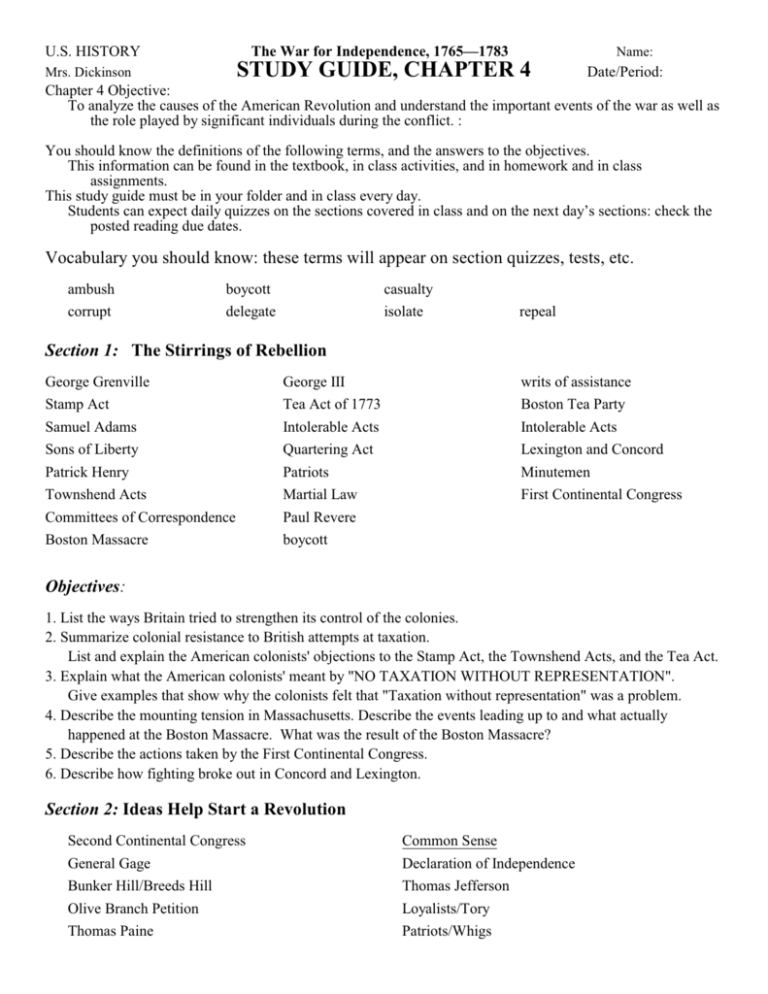
U.S. HISTORY The War for Independence, 1765—1783 Name: STUDY GUIDE, CHAPTER 4 Mrs. Dickinson Date/Period: Chapter 4 Objective: To analyze the causes of the American Revolution and understand the important events of the war as well as the role played by significant individuals during the conflict. : You should know the definitions of the following terms, and the answers to the objectives. This information can be found in the textbook, in class activities, and in homework and in class assignments. This study guide must be in your folder and in class every day. Students can expect daily quizzes on the sections covered in class and on the next day’s sections: check the posted reading due dates. Vocabulary you should know: these terms will appear on section quizzes, tests, etc. ambush corrupt boycott delegate casualty isolate repeal Section 1: The Stirrings of Rebellion George Grenville Stamp Act Samuel Adams Sons of Liberty Patrick Henry Townshend Acts Committees of Correspondence Boston Massacre George III Tea Act of 1773 Intolerable Acts Quartering Act Patriots Martial Law Paul Revere boycott writs of assistance Boston Tea Party Intolerable Acts Lexington and Concord Minutemen First Continental Congress Objectives: 1. List the ways Britain tried to strengthen its control of the colonies. 2. Summarize colonial resistance to British attempts at taxation. List and explain the American colonists' objections to the Stamp Act, the Townshend Acts, and the Tea Act. 3. Explain what the American colonists' meant by "NO TAXATION WITHOUT REPRESENTATION". Give examples that show why the colonists felt that "Taxation without representation" was a problem. 4. Describe the mounting tension in Massachusetts. Describe the events leading up to and what actually happened at the Boston Massacre. What was the result of the Boston Massacre? 5. Describe the actions taken by the First Continental Congress. 6. Describe how fighting broke out in Concord and Lexington. Section 2: Ideas Help Start a Revolution Second Continental Congress General Gage Bunker Hill/Breeds Hill Olive Branch Petition Thomas Paine Common Sense Declaration of Independence Thomas Jefferson Loyalists/Tory Patriots/Whigs U.S. HISTORY Mrs. Dickinson The War for Independence, 1765—1783 STUDY GUIDE, CHAPTER 4 Name: Date/Period: Objectives: 1. Describe the actions taken by the Second Continental Congress-what efforts were made to avoid bloodshed? 2. What were the complaints of the colonists according to what was written in the Declaration of Independence? 3. Where did the author of the Declaration of Independence get his ideas about government, etc.? 4. Describe the Loyalists. What did the Loyalists hope to accomplish in the war? 5. Compare and contrast the attitudes of Loyalists and Patriots. Section 3:Struggling Toward Saratoga Battles: New York, Trenton Saratoga George Washington General Howe privateers Valley Forge Princeton profiteering inflation George Rogers Clark - Kaskaskia, Cahokia, Vincennes Objectives: 1. How is the war going at the end of 1777? Why is Saratoga a turning point in the war? 2. Describe the colonial economy and civilian life during the Revolution. 3. List the American (Continentals) and British advantages and disadvantages during the war. 4. What is the importance George Rogers Clark’s campaign, and the victories at Kaskaskia, Cahokia, and Vincennes? Section 4: Winning the War Battles: Monmouth, Yorktown Frederich von Steuben Benedict Arnold Marquis de Lafayette General Charles Cornwallis Treaty of Paris, 1783 egalitarianism Objectives: 1. Describe the war in the South. What were the British goals? What were the American goals? 2. Describe the battles between the Continentals and the British in the American Revolution. Include the date and location of the battle, who won, and why the battle is significance. 3. How does the alliance with France and Spain help the colonials win the Revolution? 4. Describe the British surrender at Yorktown. 5. List and describe the terms of the Treaty of Paris of 1783. How did the United States benefit? How did England benefit? What issues were left unresolved? 6. What is the symbolic value of the American Revolution? What are the challenges facing the new United States?
